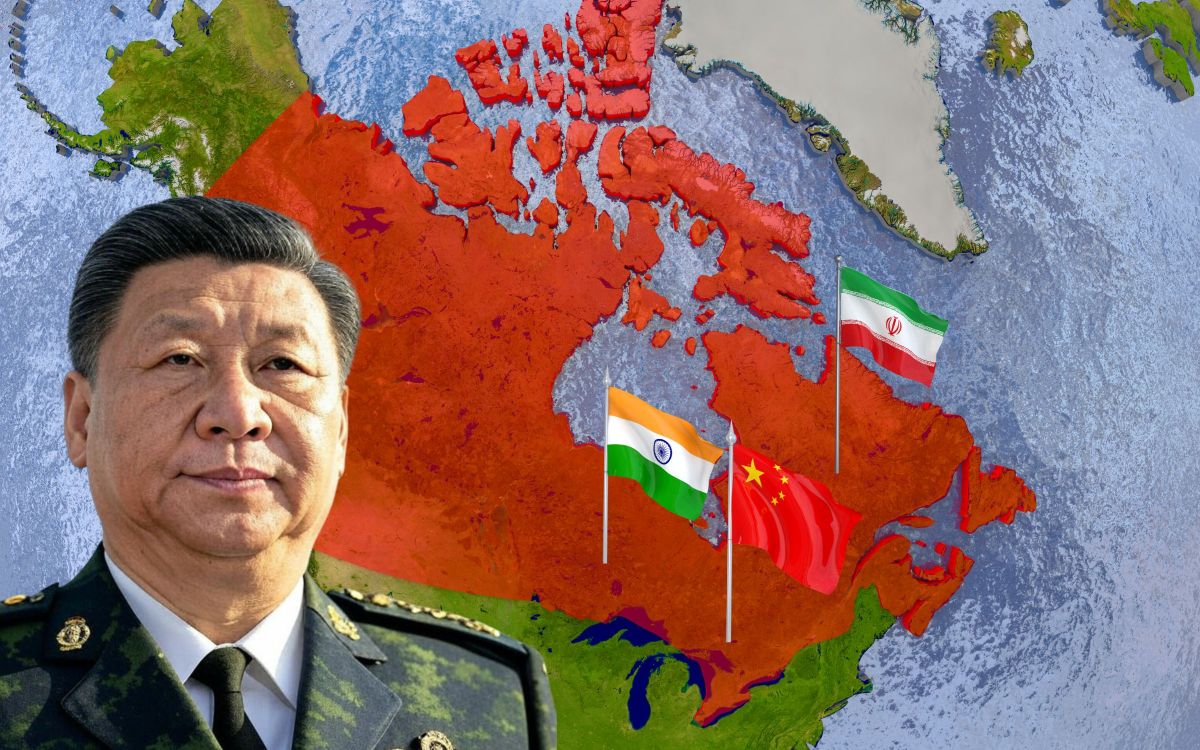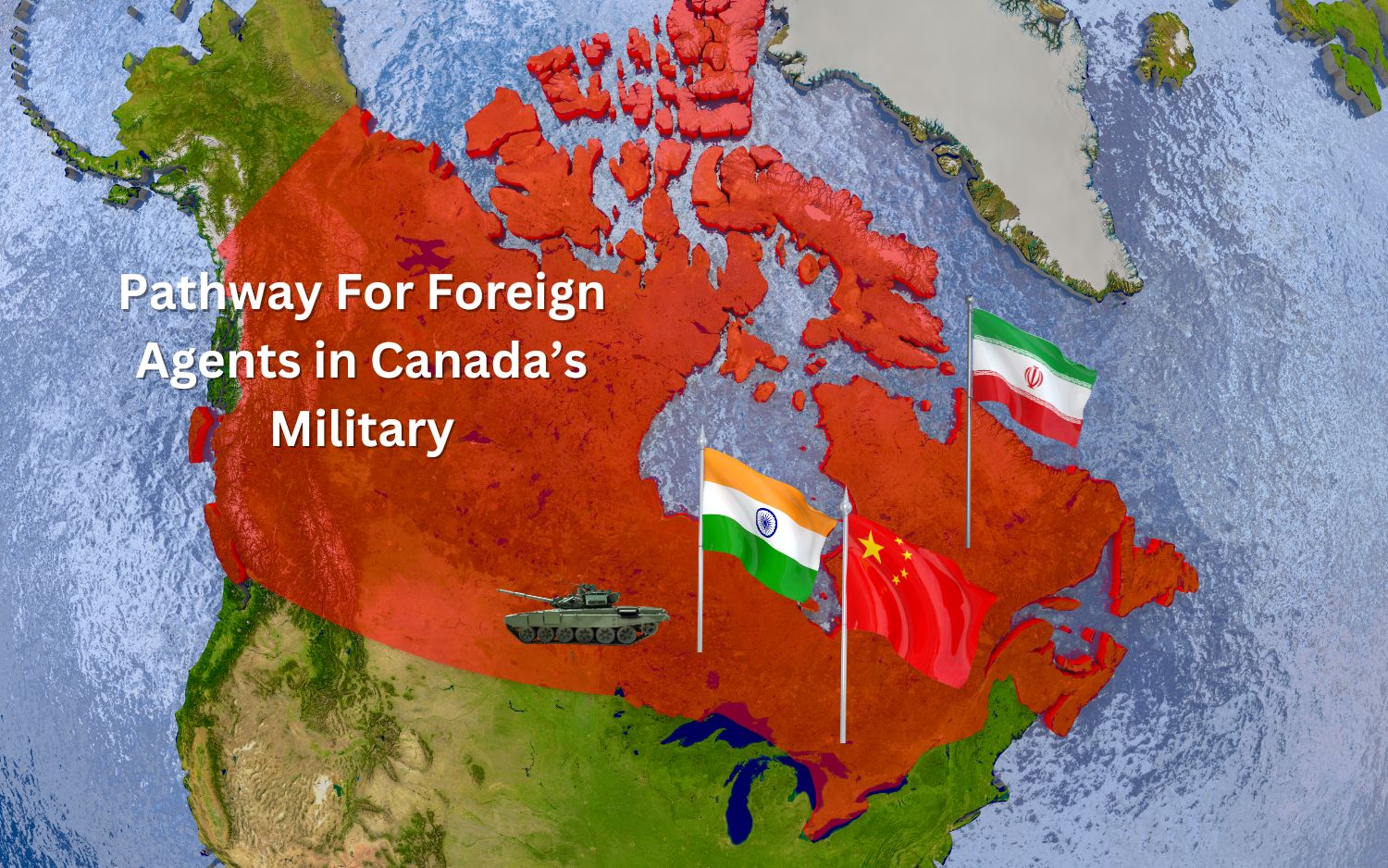China’s Infiltration of the Canadian Government and the Dangerous Precedent of Foreigners in the Military

In recent years, evidence has mounted suggesting that the People’s Republic of China (PRC) has engaged in a sophisticated campaign to infiltrate and influence Canadian governmental institutions. From election interference to espionage targeting politicians, this pattern of behavior has raised alarm bells among security experts and policymakers.
The Canadian government’s recent announcement allowing foreigners to join its military adds a new and troubling dimension to this issue, potentially opening the door for adversarial nations like China, Iran, and India to embed agents within Canada’s armed forces. This development sets a dangerous precedent for North American security, threatening not only Canada’s sovereignty but also the broader stability of the continent.
A History of Infiltration
Canada has long been viewed as a prime target for Chinese influence operations. The Canadian Security Intelligence Service (CSIS) has repeatedly warned that the PRC is the "foremost perpetrator" of foreign interference in the country, employing tactics ranging from disinformation campaigns to clandestine funding of political candidates. Reports from CSIS, corroborated by media investigations, indicate that China interfered in the 2019 and 2021 federal elections, aiming to bolster candidates perceived as "pro-PRC" or neutral on issues critical to Beijing’s interests. These efforts included leveraging diaspora communities and proxies managed by the Chinese Communist Party’s United Front Work Department to sway electoral outcomes.
Beyond elections, China’s influence has extended into Canada’s political and economic spheres. High-profile cases, such as the targeting of Conservative MP Michael Chong and his family, illustrate how Beijing uses intimidation and coercion to silence critics. Classified CSIS documents have revealed that Chinese intelligence services, including the Ministry of State Security, have sought to compromise Canadian officials traveling to China and have cultivated networks of influence through unreported donations and community organizations. Former CSIS officials, like Michel Juneau-Katsuya, have pointed to decades of overlooked warnings about Beijing’s infiltration efforts, suggesting a systemic failure to address the threat adequately.
This infiltration has not been limited to political circles. The PRC has also been accused of exploiting Canada’s open academic and business environments to acquire sensitive technology and intellectual property, often with military applications. Meanwhile, the Canadian government’s reluctance to impose strong deterrents—such as a foreign agent registry similar to those in the United States and Australia—has emboldened these activities, with CSIS noting that foreign interference remains a "low-risk, high-reward" endeavor in Canada.
The Military Announcement: A New Vulnerability

Against this backdrop, the Canadian government’s decision in late 2024 to allow foreigners to join the Canadian Armed Forces (CAF) has sparked intense scrutiny as it comes into effect as announced today on February 20, 2025. Framed as a solution to recruitment shortages, the policy permits non-citizens with permanent residency to enlist, with a pathway to citizenship after three years of service. While the move ostensibly aims to bolster military readiness, it raises significant security concerns given the documented efforts of adversarial states to penetrate Canadian institutions.
Historically, military service has been a cornerstone of national loyalty and identity, with strict citizenship requirements ensuring allegiance to the state. By relaxing these standards, Canada risks creating an entry point for foreign actors—particularly from nations like China, Iran and India, which have large diaspora populations in Canada and documented histories of espionage. The PRC, with its well-established networks in Canada, could exploit this policy to place agents within the CAF, gaining access to sensitive military intelligence, training, and operational strategies. Similarly, India, while an ally in some contexts, has faced allegations of conducting covert operations in Canada, as evidenced by recent diplomatic tensions over the killing of a Sikh separatist on Canadian soil.
Implications for North American Security
The implications of this policy extend beyond Canada’s borders, setting a perilous precedent for North American security. Canada and the United States share an integrated defense framework through NORAD and NATO, relying on seamless coordination to protect the continent. Any compromise within the CAF could undermine this partnership, providing adversaries with insights into joint operations, Arctic defense strategies, and critical infrastructure vulnerabilities. China’s growing interest in the Arctic—where it has deployed surveillance buoys and sought to expand its presence—only heightens the stakes.
Moreover, the absence of robust vetting mechanisms and unchecked immigration with criminals and terrorists pouring into Canada exacerbates the risk. While the CAF has pledged to enhance background checks, the complexity of screening foreign nationals with ties to adversarial states poses a formidable challenge and Canada has proven a failed record when it comes to security checks. China’s use of proxies and coercion within diaspora communities could obscure an individual’s true loyalties, making it difficult to detect planted agents. The precedent this sets could also pressure the U.S. to consider similar measures, further weakening North America’s collective security posture at a time of escalating global tensions.
A Call for Reconsideration
Critics argue that Canada’s decision reflects a troubling naivety about the evolving nature of geopolitical threats. Rather than addressing the root causes of military recruitment challenges—such as improving domestic incentives or countering foreign disinformation targeting youth—the government has opted for an expedient fix with long-term consequences. This move contrasts sharply with the U.S., which tightened restrictions on foreign research and military cooperation after recognizing China’s exploitation of open systems.
To safeguard its sovereignty and North American security, Canada must reconsider this policy. Strengthening counterintelligence efforts, implementing a foreign agent registry, and enhancing diplomatic pushback against interference should take precedence over opening the military to untested risks. The PRC’s infiltration efforts have already exposed vulnerabilities in Canada’s democratic and economic institutions; extending this vulnerability to the military risks crossing a line from which recovery may be difficult.
China’s infiltration of the Canadian government has been a slow-burning crisis, marked by missed opportunities to act decisively. The decision to allow foreigners into the CAF amplifies this threat, potentially handing adversarial nations a direct line into Canada’s defense apparatus. As a key player in North American security, Canada cannot afford to prioritize short-term fixes over long-term stability. Without a course correction, this policy may not only undermine Canada’s sovereignty but also destabilize the continent’s defenses, inviting exploitation by those who have already shown their intent to wield influence from within.









